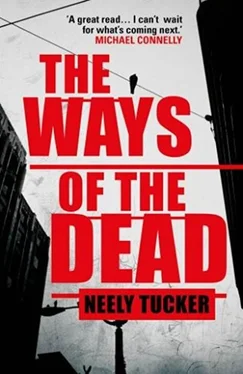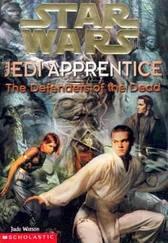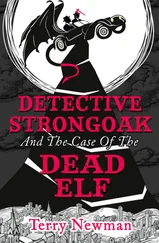Quickly, he inverted the flashlight, pointing it straight down. He put his hand over the glass, flicked it on and let the light bleed down through his fingers, illuminating his feet. Dirt and nothing else. He took one step. No sound. Then another step and two more and he stopped.
He was beside the grave and out of the line of sight from the landing at the top of the stairs. He turned the light off. The footsteps above him did not go up the stairs to the second floor, but seemed to wander from room to room, back to the front door.
Then, without warning, they raced down the narrow hallway babababam and stopped, just as suddenly, at the basement door.
Sully ducked backward, kneeling, almost falling over. He was desperate to get out of the line of sight. All that son of a bitch had to do was lean forward with a flashlight and they’d have him pinned like a bug on an insect board.
The shadow at the top of the stairs did not step forward onto the landing. It did not move the door backward or forward. It stood there for one minute, two. Sully, his legs starting to cramp, breathed into his hands.
The door to the basement creaked forward, as if lightly pushed. It bumped against the wall, then swung back, and before it hit the jamb a darker shadow appeared.
A flash leapt from the end of the shadow, a bullet- phhhffttt -slamming into the dirt beside Sully, stunning him. The second shot shattered a broken piece of wood, Sully staring at it, thinking, Silencer , the person above has a silencer, and there were two more flashes, cracking a slab of marble, ricocheting off the concrete block wall.
Sully took a step backward and his heel caught on something in the dark. He wobbled too far back, his momentum was carrying him past the point of balance, he couldn’t stop it. Helpless, he raised the pistol and fired as he fell, one two three times, hitting the steps, the landing, blowing a hole in the basement door.
The blasts covered the noise of his falling in the dirt and whatever he’d tripped over. It felt like an overturned bucket. He rolled to his right and stopped, gun up.
Two rounds came back at him, one slamming into the dirt, the other shattering a chunk of porcelain. The steps above him retreated toward the front door, Sully tracking the sound with his pistol but not firing.
The front door open and slammed. Silence fell.
Sully closed his eyes and opened them, ears ringing from the blasts of his gun, the weapon still up and out, his left hand bracing his right wrist.
He stood slowly, letting the blood circulate down his stiffening legs. His right knee-God. He swung it back and forth several times. He held his left arm out and shone the flashlight at it. Six twenty-two. He shut the flashlight off and counted. When he got to one hundred and had heard nothing, he turned the flashlight back on. Six twenty-four.
The gunman was gone or waiting him out, hiding just inside the front door, the slamming a ruse to draw him out.
He shone the light over the dirt and carefully walked to the bottom of the steps.
Once there, he counted again, this time to fifty, scarcely breathing, and then took one step on the stairs, flashlight in his left hand, pistol in the right. Listening, holding his breath. Nothing. Then he rushed up the rest of the steps and yanked open the door. He stopped, just for a half beat, and then flashed a hand out into the first floor. Nothing.
Whoever it was had gone.
A breath let out of him, slow, involuntary. He put the pistol back in his jacket. A careful step took him onto the landing, then into the hallway. Nothing was any more amiss than it had been before. He was surprised to see the intruder had not taken his backpack.
Picking it up, quickening his step, he listened for sirens-had nobody else heard the gunshots?-and trotted back to the kitchen and a door that opened onto the backyard. He peered out the window; nothing but high grass and trash. The dead bolt was still in place. It turned easily. A tug on the handle and the door popped open.
The fresh air washed over him like an absolution. He breathed it in deeply, looking outside before stepping there, wiping a hand across the sweat on his forehead. He pulled the door closed behind him and walked quickly to the back of the property.
He vaulted himself over the iron fence with a grunt and a hop on his gimpy leg and found himself in a narrow walkway that ran off the alleyway behind the shops on Georgia. A few steps brought him to the curved part of the alley, his hands trembling, nerves firing. It was rough concrete with bits of gravel. To his right, the dumpster behind Doyle’s sat thirty feet away. He looked to his left and the alleyway curved out of sight. Just around the bend, he knew, would be the dumpsters for the Hunger Stopper and other stores. You couldn’t see them from here. The dumpster where Sarah was killed, or had been dumped, was in a blind spot.
Sully turned to his right and walked to the dumpster. It was conspicuously green, without a spot of rust. It looked new. He walked down the rest of the alley, onto Princeton Place, and turned left. A few feet later, he was walking past the tiny parking lot for Doyle’s, and then onto the sidewalk of Georgia.
Lights were on in the stores, the streetlights cast an overhead glow. Cars had their headlights on, red brake lights tapping. It was rush hour. Nobody was screaming, nothing had happened. The stars were in their courses. Just after he passed the Hunger Stopper and turned onto Otis, heading back toward the bike, Doyle flashed through his mind.
Christ. He’d forgotten.
Doyle was reading a magazine behind the counter. The store was empty, the light was flat. Something else was odd, and it took Sully a second to peg it-there was no television blaring.
“She’s off getting her hair done,” Doyle said when Sully asked.
Sully got a bag of peanuts and a Coke and headed for the counter, buying something just to be sociable, to give his hands something to do, the blood still thrumming from the shooting. Doyle, peering over his glasses, rang it up and said Bettie had taken to leaving him several days a week to mind the store on his own.
“Scared silly,” he said, letting out a sigh. His khakis were pressed to a sharp crease, his blue oxford-cloth button-down shirt starched into place.
“You have other folks working for you, though, right?”
“A couple or three. But Bettie’s family. I pay her a salary. Everyone else is hourly. If I call somebody else in, I’m paying her and them.”
“Maybe you should just tell her to take a week out.”
“I guess I could. Customers do love her, though, and we need to keep people reassured right now. Business is bad enough off as it is.”
Sully, chewing a handful of peanuts now, took another swig of the soda to wash them down. “Which reminds me,” he said. “Customers.” He reached into his backpack, giving Doyle time to get comfortable to say whatever he was going to say, rustled past the notebooks, and found the pictures of the girls.
He set them out on the counter, spinning them around so they would be right side up for Doyle. “You recognize any of these three? Lana Escobar, Noel Pittman, and this one is Michelle Williams. I’m writing about the neighborhood.”
“They all live right around here?” Doyle asked.
Sully took another handful of peanuts, chewing as he talked. “Yeah. A couple blocks. I’m asking around this afternoon. They come in here much? You know ’em at all?”
Doyle was looking down at them, peering through his glasses. He gave them a thoughtful looking over.
“Maybe, I don’t know. Bettie does most of the register, I’m in the back. Who’s this one? Think I saw her walking on Princeton. This business, it’s hard to keep track of the young people. The older customers, the steadies? Those you know.”
Читать дальше












